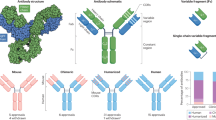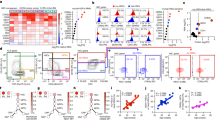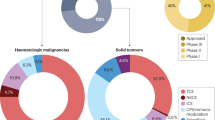Abstract
ANTISERUM can potentially interfere with effective immunity at three different parts of the immune response: afferent, central and efferent1–6. Coating or masking of antigenic sites on tumour cells with antiserum could render the cells non-immunogenic1,2—called afferent block—or protect them from attack by immune lymphocytes3,4—called efferent block. In central interference, the ability of the lymphocytes to become sensitised against tumour antigens is suppressed, or immune cells are made non-reactive by the humoral factors5,6. Most early studies in this area were performed with tumour allografts or used antisera with antigenic specificities which were not well characterised. Only a few studies have been performed with syngeneic tumours7,8. Because of the complexity of surface antigens expressed on tumour cells, the effects of the antisera on the tumour-associated transplantation antigen (TATA) was therefore difficult to assess.
This is a preview of subscription content, access via your institution
Access options
Subscribe to this journal
Receive 51 print issues and online access
$199.00 per year
only $3.90 per issue
Buy this article
- Purchase on Springer Link
- Instant access to full article PDF
Prices may be subject to local taxes which are calculated during checkout
Similar content being viewed by others
References
Snell, G. D., Winn, H. J., Stimpfling, J. H., and Parker, S. J., J. exp. Med., 112, 293–314 (1960).
Möller, G., J. natn. Cancer Inst., 30, 1153–1175 (1963).
Möller, G., J. natn. Cancer Inst., 30, 1205–1226 (1963).
Hellström, I., and Hellström, K. E., Int. J. Cancer, 5, 195–201 (1968).
Takasugi, M., and Hildemann, W. H., J. natn. Cancer Inst., 43, 843–855 (1969).
Amos, D. B., Cohen, I., and Klein, W. J., Jr, Transplant. Proc., 2, 68–75 (1970).
Möller, G., Nature, 204, 846–847 (1964).
Bubenik, J., and Koldovsky, P., Folia Biol., 11, 258–265 (1965).
Ting, C. C., and Herberman, R. B., Cancer Res., 34, 1676–1683 (1974).
Ting, C. C., Ortaldo, J. R., and Herberman, R. B., J. natn. Cancer Inst., 52, 815–821 (1974).
Ting, C. C., Lavrin, D. H., Shiu, G., and Herberman, R. B., Proc. natn. Acad. Sci. U.S.A., 69, 1664–1668 (1972).
Ting, C. C., Shiu, G., Rodrigues, D., and Herberman, R. B., Cancer Res., 34, 1684–1687 (1974).
Sjögren, H. O., Hellström, I., Bansal, S. C., and Hellström, K. E., Proc. natn. Acad. Sci. U.S.A., 68, 1372–1375 (1971).
Hellström, I., Hellström, K. E., Sjögren, H. O., and Warner, G. A., Int. J. Cancer, 8, 185–191 (1971).
Perlmann, P., and Holm, G., in Adv. Immun. (edit. by Dixon, P. J., Jr, and Kunkel, H. G.) 11, 117–195 (Academic, New York, 1969).
Pollack, S., Int. J. Cancer, 11, 138–142 (1973).
Author information
Authors and Affiliations
Rights and permissions
About this article
Cite this article
TING, CC., HERBERMAN, R. Specific afferent interference by antiserum of in vivo immunity. Nature 257, 801–802 (1975). https://doi.org/10.1038/257801a0
Received:
Accepted:
Issue Date:
DOI: https://doi.org/10.1038/257801a0
This article is cited by
Comments
By submitting a comment you agree to abide by our Terms and Community Guidelines. If you find something abusive or that does not comply with our terms or guidelines please flag it as inappropriate.



